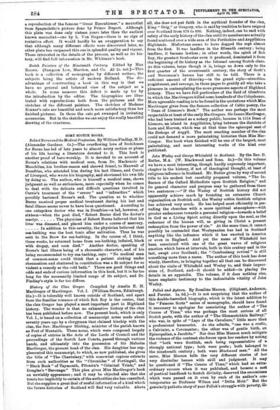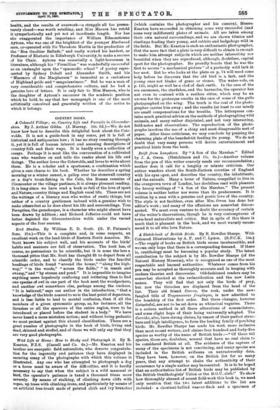Polled and Aytoun. By Rosaline Masson. (Oliphant, Anderson, and Ferrier.
is. 6d.)—It is not surprising that the author of this double-barrelled biography, which is the latest addition to the "Famous Scots" series of monographs, should have found it necessary to apologise for associating the author of "The Course of Time," who was perhaps the most serious of all Scotch poets, with the author of "The Glenmutchkin Railway," who was, in spite of "Lays of the Cavaliers," little more than a professional humourist. As she admits, "one was a rustic, a Calvinist, a Covenanter ; the other was of gentle birth, an Episcopalian, a Jacobite." Nor does Miss Masson much mitigate the violence of the contrast she forces upon her readers by noting that "both were Scottish, each being representative of a strongly national type ; both were poets ; both belonged to the nineteenth century ; both were Blackwood men." All the same, Miss Masson tells the very different stories of her very dissimilar heroes with skill and judgment. It may be questioned if "The Course of Time," which had an extra- ordinary success when it was published, and became a sort of poetical handbook to Scotch divinity, deserved the encomiums which were passed on it even by such of its author's con- temporaries as Professor Wilson and "Delta Moir." But the genuinely pathetic story of poor Pollok's struggle with poverty, ill- health, and the results of overwork—a struggle all too prema- turely closed—was worth retelling, and Miss Masson has retold it sympathetically and yet not at inordinate length. Nor has she exaggerated the importance of William Edmonstoune Aytoun, who was one of the brightest of the younger Blackwood men, co-operated with Sir Theodore Martin in the production of the "Bon Gaultier Ballads," and really worked his hardest, as Professor of Rhetoric in Edinburgh University, to make a success of his Chair. Aytoun was essentially a light-horseman in literature, although his " Firmillian " was wonderfully successful as an onslaught upon the "spasmodic school" of poetry repre- sented by Sydney Dobell and Alexander Smith, and his "Massacre of the Macpherson" is immortal as a caricature of Highland pride and " sanguinariness." But he was a man of very considerable and comprehensive culture, and he had a genuine love of letters. It is only fair to Miss Masson, who is the daughter of Aytoun's successor in the academic position which he held, to say that her monograph is one of the most artistically conceived and gracefully written of the series to which it belongs.























































 Previous page
Previous page